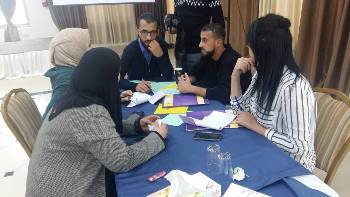|
MIFTAH completes a series of specialized training workshops on mobilizing community activists towards enhancing Gender Equality and promoting Women Participation in local Governance
MIFTAH, in partnership with the Program for Empowering Women in Decision-Making in the Middle East, implemented by GIZ under mandate from BMZ and through its project "Enhancing Gender Equality and promote Women Participation in local Governance in West Bank including east Jerusalem and Gaza Strip", recently conducted three training workshops that targeted groups of male and female activists in the Jerusalem, Nablus and Hebron districts. The workshops focused on ways of supporting women’s political participation in local government through promoting gender equality and forming pressure groups to promote social justice pertaining to gender issues. The training workshops were attended by nearly 100 activists and were conducted by gender experts and pioneers of social transformation in conflict “KUMI methodology”. This method is used in the analysis of cultural inheritance and its impact on laws and legislation and the extent to which it has achieved justice and equality. It aims at providing equal opportunities for both men and women in social and political participation to boost their contribution to development in their communities. Co-facilitator Hassan Mahariq said the three-day workshop was aimed at producing groups supportive of gender issues in local communities. He said the KUMI method for social transformation was used, which allowed the participants to analyze their environment and identify the most significant conflicts they encounter as a result of contradicting social issues. “With the use of analytical tools, the participants were able to identify the most significant obstacles to empowering women to actively participate in public life, especially political participation,” Mahariq said. He continued that focus was put on a number of social fault lines which in turn lead to disharmony. “The participants would analyze the conflict in question and analyze it through the use of cultural inheritance and its relation to every day practices. They would also consider its reflection on the structural system which is considered a product of the deeply embedded cultural framework in Palestinian society,” Mahariq maintained. He said they were aware that it was necessary to synchronize the processes of bridging the gaps between social components as part of a comprehensive process including the need to empower women towards political participation as a result of social change. “This allows society, in all its components, to participate in the social change process,” he said. Furthermore, Mahariq went on to say that the participants analyzed the political and legal systems, including their disregard of the needs of social sectors, including women. “We focused on the most significant laws that confine women to a certain framework without responding to their needs or the developments that have taken place in terms of women’s participation in public life.” The participants all agreed that the training was based on reorganizing their thoughts and placing them in a more scientific and organized framework unlike other trainings which were based on only receiving information and experiences. Najwa Yaghi, MIFTAH’ s projects manager said these groups, which represent a number of cities and towns in the West Bank, will work later with influential individuals at the social and political levels. Together they will develop a number of initiatives that will create social action aimed at enhancing women’s political participation at the local level, an experience that will be shared at the regional level throughout 2017. Yaghi said MIFTAH will also carry out this experiment in two Gaza Strip districts. MIFTAH considers these workshops as a preparatory phase to launch a series of focused interventions that primarily target influential and intellectual personalities and decision makers in different local communities to advocate jointly with community activists to defend women’s political and civil rights. MIFTAH believes that working in a complementary manner is the pathway leading to social change.

http://www.miftah.org |